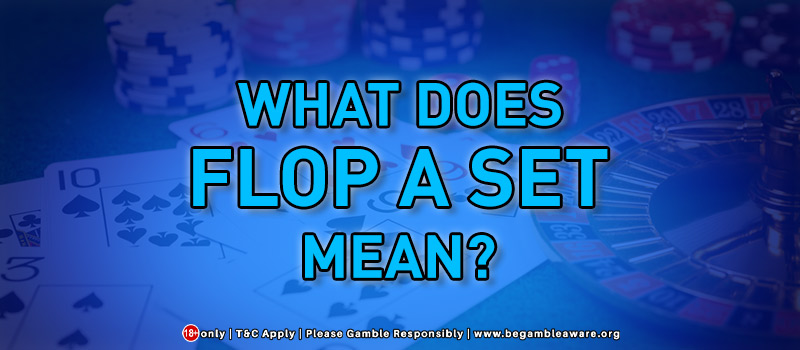A set mean is generally defined on the note of three of a kind. People commonly refer to a particular set when any of a player has a three of a kind having a pocket pair, with a board matching that rank of the pocket pair in hold’em.
However, a few people have subjected a fake understanding about set means and the way odds should technically be expressed. If a player comes across such actions on the table, then a player will indeed need to hit a set on the flop with a pocket pair approximately 1 in 8 times, which will technically equal to odds of 1 to 7 as opposed to 7 to 1. The 7 to 1 odds reflect the odds against hitting the set. As the odds are expressed, it efficiently sets that for every 1 time a player can hit a set, there will be approximately 7 other times a player can’t. So 1 out of 8 times OR 1 to 7 is more likely applicable.

If a player tends to calculate the pot odds, though it becomes quite a bit more complicated due to the two additional streets left to come as well as implied odds, on the other side, if there are no other streets formed and a player’s pocket pair and the flop to work with, the pot would have to be laying you odds of 7 to 1 in order for a player to call the bet. Moreover, if the bet is to the player and there is no further action and no additional street options, the wager is of $10, so there would have to be $70 in the pot for a call to be equivalent in the long term.
The primary fact regarding the flop on the set mean, there are two more streets to come and implied odds that come into play, it may or may not be fair to make the call. A player always needs to understand that if a player makes a successful set on the table doesn’t mean a player can win the hand in the end. It can often be the best hand on the flop, and a player could easily be imitated to bring value on further streets. Therefore, it is best not to chase sets unless the stacks of the players that are already in the pocket. This can give the player a liability to provide much better-implied odds to make the call. Also, a player needs to be extremely specific with a good calculation skill which will result to get action after flopping the set.
Moreover, sets can be efficient in producing an effective deal of profit with a disguised nature- rarely are people able to put you on a set. Chasing a set can also cost a lot of money. If a player has enough pot cheap including stacks, even if you have reason to believe you beat pre-flop, there might be some rare instances where it is equitable to stay in and chase the set, though.
After the end of flop betting round, a single community card commonly called the turn or fourth street is dealt, followed by a third betting round. A final single community card generally called the river, or the fifth street is then dealt, followed by a fourth betting round and the showdown if needed any.